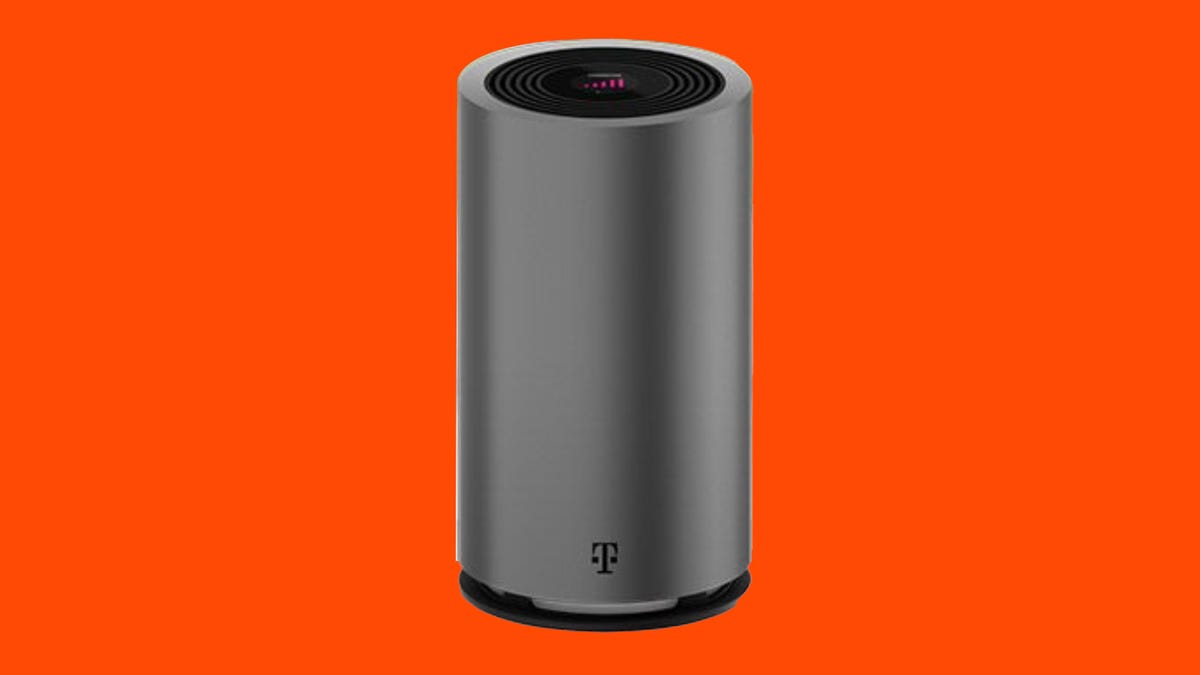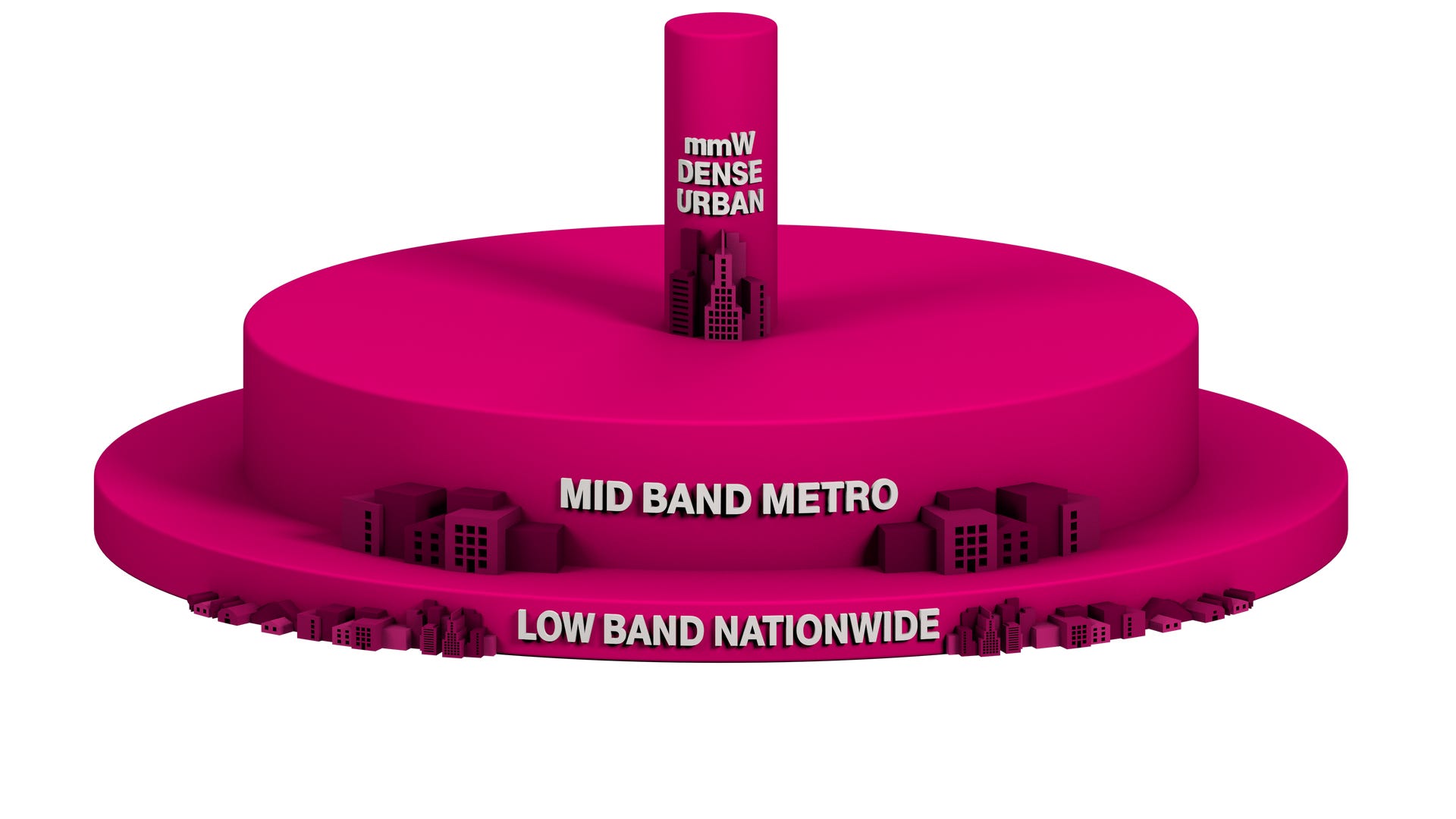Provider unavailable in
Pros
- No contracts
- No data caps
Cons
- Speeds may vary
- Max download speeds don’t match fiber and cable
See more pros and cons

Check the T-Mobile Home Internet eligibility page to determine if your address is serviceable.
When will T-Mobile Home Internet get to my area?
As mentioned, T-Mobile is the most widely available 5G home internet service. But when you consider that US Census data puts the total number of households in the country at over 124 million, about 68% of households remain ineligible for T-Mobile Home Internet.
A T-Mobile spokesperson didn’t have specific details on expansion plans but highlighted that more than 10 million households in the current footprint are within rural America. Additionally, there’s a focus on expanding access for small towns and communities. For those outside the current availability window, T-Mobile’s site mentions that expansion could take six months or more and allows interested parties to put their name on the list for down the road.
That said, T-Mobile also announced a Home Internet Lite service, open to anyone within a T-Mobile service area. While that broadens the company’s availability footprint, it wouldn’t be right to include this as part of T-Mobile Home Internet, as Lite has a 100GB data cap.
T-Mobile Home Internet: Plans and prices
Simplicity is one of the biggest things that jumps out at me when I look at T-Mobile Home Internet. There isn’t an array of tiers and options from which to choose because there’s one plan and one plan only.
T-Mobile Home Internet pricing
T-Mobile provides its Wi-Fi Gateway device, a combination modem and Wi-Fi 6 router compatible with T-Mobile’s 4G LTE and 5G networks. As you can see from the chart, the only variable is the average download and upload speed you’ll experience. At the bare minimum, T-Mobile says all eligible households will see average download speeds of 33 megabits per second. Depending on your location and the placement of the T-Mobile Gateway, you might see download speeds as high as 182Mbps or more.

Enlarge Image

All that said, there is one additional fee you’ll have to pay once at the start of your service: a $35 “device connection charge” similar to the activation fee you pay with many ISPs.
T-Mobile Home Internet: Promotional offers
In addition to its consumer-friendly simplicity, T-Mobile is sweetening the pot for potential customers.
First, families with eligible Magenta Max plans can save $20 monthly. T-Mobile also offers new customers six months of SiriusXM (a $66 value) and a full year of the Spanish-language streaming service ViX Plus. Third, you can subscribe to Philo TV for $15 a month for one year ($10 off monthly). Fourth, home internet customers can participate in T-Mobile Tuesdays, the company’s weekly discount and free perks promotion.
Additionally, T-Mobile boasts a Price Lock guarantee, which means no rate changes for as long as you remain a customer. It also runs a “Worry-free Test Drive” promotion, during which customers can try the service for 15 days with a money-back guarantee. Also, T-Mobile is offering customers $50 back in a virtual prepaid Mastercard if they switch over to T-Mobile Home Internet from another provider. Lastly, if customers are switching from a provider midcontract, T-Mobile will pay up to $750 in termination fees. That’s impressive.
T-Mobile Home Internet vs. 5G competitors
Regarding availability, T-Mobile is ahead of its 5G home internet competitors, Starry and Verizon. Starry is available in five major metropolitan areas: Boston, Denver, Los Angeles, New York City and Washington, DC. Verizon is available in more cities than T-Mobile (currently 900) but is behind T-Mobile’s total households covered.
However, Starry and Verizon have the upper hand on average download speeds. Starry customers typically see consistent download speeds of 200Mbps, and Verizon’s 5G Home Internet plans average around 300Mbps. What Starry and Verizon have given up regarding widespread availability, they currently make up for in the average speeds they deliver.
All three 5G home internet providers share freedom from all the hidden fees and pricing games that many cable and fiber ISPs play. With 5G, the monthly rate is the monthly rate. There are no added fees, equipment rental charges, data caps or binding annual contracts.
Does T-Mobile Home Internet come with a router?
Yes. One of the appealing aspects of T-Mobile Home Internet is that its monthly fee — $50 a month if you use AutoPay and $30 a month for eligible Magenta Max mobile customers — includes a 5G Gateway (a modem/router combo device). The T-Mobile equipment lease is included in the one fee, and all that’s required is that you return the device when you end service with T-Mobile.
Is T-Mobile Home Internet faster than satellite internet?
For the most part, yes, but not unequivocally. As T-Mobile says in its Open Internet policy, “many factors affect the speed and performance that customers experience, including … proximity to a cell site, weather and the surrounding terrain,” so your download speeds, which average between 33-182Mbps, are not guaranteed. But customers should see download speeds higher than those typically achieved by HughesNet (average of 25Mbps) and Viasat (12-100Mbps). The Starlink plans boast a higher range (20-250Mbps) but are not as widely available as T-Mobile Home Internet. It’s also much more expensive — $90-$120 a month, plus a one-time equipment fee of $599.

